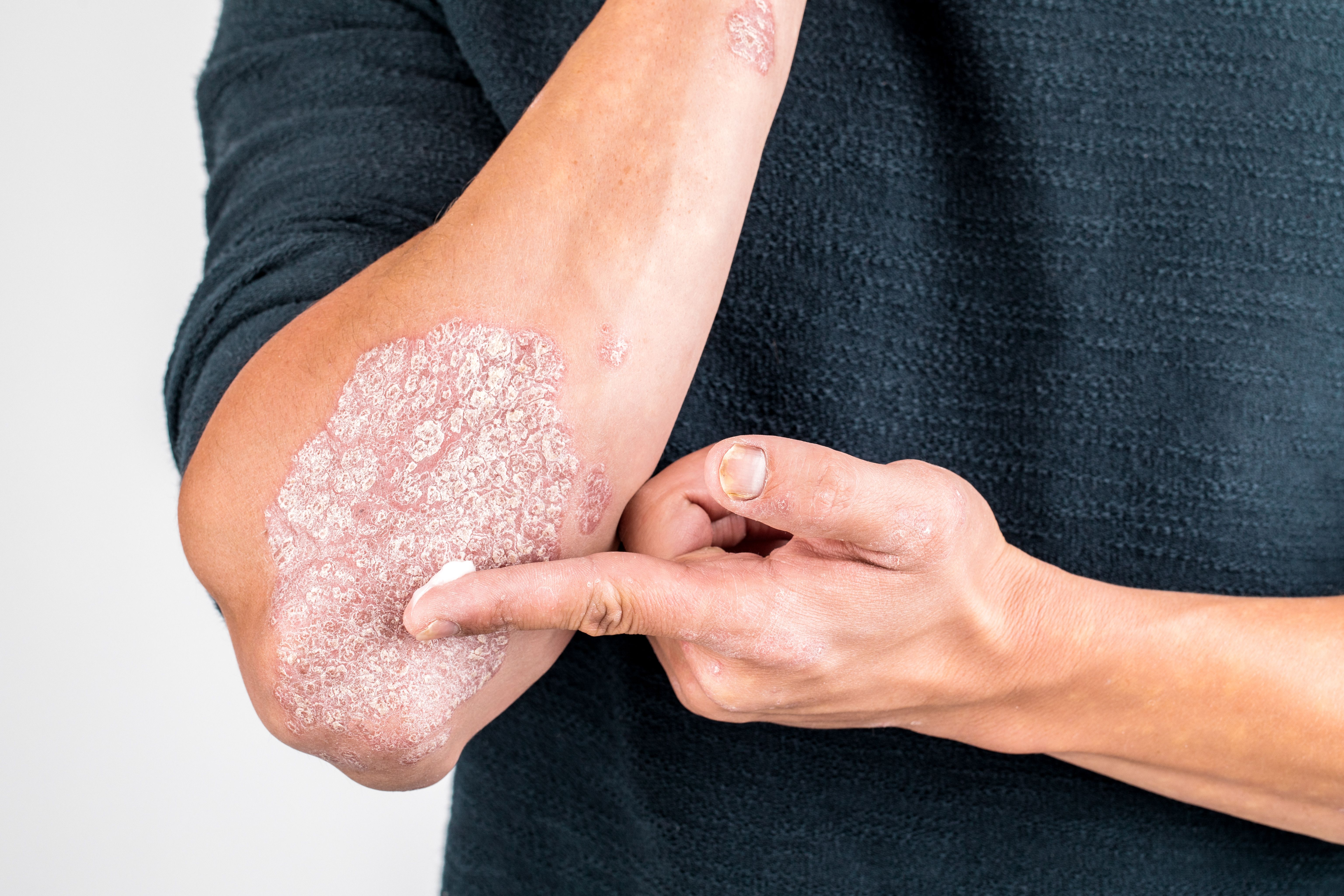- Case-Based Roundtable
- General Dermatology
- Eczema
- Chronic Hand Eczema
- Alopecia
- Aesthetics
- Vitiligo
- COVID-19
- Actinic Keratosis
- Precision Medicine and Biologics
- Rare Disease
- Wound Care
- Rosacea
- Psoriasis
- Psoriatic Arthritis
- Atopic Dermatitis
- Melasma
- NP and PA
- Skin Cancer
- Hidradenitis Suppurativa
- Drug Watch
- Pigmentary Disorders
- Acne
- Pediatric Dermatology
- Practice Management
- Prurigo Nodularis
- Buy-and-Bill
Video
Moderate to Severe Plaque Psoriasis: What is the Standard of Care?
Author(s):
Taking a broader look at moderate to severe plaque psoriasis, experts consider what the standard of care would be in different settings.
Transcript:
Christopher G. Bunick, MD, PhD: Our second segment is going to be on the systemic treatment for moderate to severe plaque psoriasis. The first question, which we’ve touched on a little, is about discussing the standard of care for initial therapy for moderate to severe plaque psoriasis. The topic of guttate psoriasis just came up. Dr Wu, this is going to be your lead. Let’s stick with guttate psoriasis into initial therapy. With guttate psoriasis, it used to be that phototherapy was 1 of the major modalities used to try to control flares. Is phototherapy still the right way to go with guttate psoriasis or are biologics the way to go with guttate psoriasis, as Dr Lebwohl indicated? No. 2, what’s the current role for topical therapy and phototherapy in psoriasis? Is there a place for phototherapy in the biologic era?
Jashin Wu, MD: In terms of treating guttate psoriasis, phototherapy can still work. But biologics are probably the best option for many patients because it will certainly clear the psoriasis and may be the “cure” for them to not have the guttate psoriasis come back. In terms of phototherapy, it still works for some patients.
I like home phototherapy for many patients. Especially during the pandemic, a lot of patients weren’t able to get a biologic or were scared about getting a biologic or not able to come into the office. If they’re able to do a home phototherapy unit, that can control the skin disease. Obviously, that’s not going to help with the joints as much, but there’s still a bit of a role for phototherapy for these patients, especially for limited disease. Excimer laser may also be good for more limited disease. But if they’ve got more than 10% body surface area, the phototherapy might not be as effective for those patients.
Christopher G. Bunick, MD, PhD: One example I had recently was a patient who refused a biologic. The patient was like, “I want phototherapy.” Do you see those types of patients come into your clinic?
Jashin Wu, MD: I do. I had 1 patient years ago who had severe disease. He’d go to the Dead Sea every year to clear his psoriasis, and he loved it. I told him, “That’s something that can be done, but it’s not viable.” He agreed, because eventually he said he was losing money. He can’t work during that time. It’s expensive to fly out there to the Dead Sea and be in a hotel for so long. He was worried about biologics at the time. I wanted to put him on adalimumab at the time, and he hemmed and hawed for 2 or 3 years and then decided, “This is the time to try 1 of these biologic agents that you’ve been harping on me about.” He did quite well and was very happy with that agent at the time.
Christopher G. Bunick, MD, PhD: Very good. Dr Torok?
Helen Torok, MD: Phototherapy is still a really good option for patients who have carcinomas and can’t use a biologic systemically. I still use phototherapy for those patients, and they’re grateful.
Christopher G. Bunick, MD, PhD: Let me follow up on that. When you talk about patients with psoriasis who have a history of cancer, how does that change how you think about treating them?
Jashin Wu, MD: That’s 1 of the few cases where I’d use ustekinumab. With PSOLAR [Psoriasis Longitudinal Assessment and Registry], it hasn’t shown to have increased risk of cancer or recurrence of the cancer. I’m sure the interleukin-17 inhibitors and IL-23 inhibitors will show the same data as well, but they’re still relatively newer and don’t have long-term data. In those few scenarios, I like ustekinumab, but I’m sure the other agents will have those data in the near future.
Christopher G. Bunick, MD, PhD: Let me rephrase the question. If you have a patient who comes in and has any type of history of cancer, what biologics are you using depending on what cancer they have?
Mark G. Lebwohl, MD: There are data coming out on IL-17s. A paper was just published in the British Journal of Dermatology with secukinumab. I was hoping it would show a benefit. They had 1% less malignancies than patients not on biologics. But the data we have so far would support what Helen says, that phototherapy is very safe to use. It omits the wavelengths of UVB [ultraviolet B] below 300 nm, which are the most carcinogenic wavelengths. You can legitimately say that phototherapy is safer than sunlight. Acitretin is the 1 treatment that has been shown to differentiate dedifferentiated squamous cells and basal cells. It makes them act more like normal skin. That combination of acitretin and phototherapy is very safe.
But I also agree with Dr Wu. Ustekinumab in the PSOLAR showed fewer cancers than patients not on biologics. We’re starting to see some data with the IL-17 blockers. There are also a lot of animal data on the IL-23 blockade suggesting that it might be beneficial, even in patients with malignancy. So I do—with great hesitancy—use IL-17 and IL-23 blockers as well. I get that question at least 3 times a week from colleagues around the country.
Helen Torok, MD: I’m a little more conservative. I wait until they’re cancer-free for 5 years, then I use biologics.
Christopher G. Bunick, MD, PhD: Dr Wu, we touched on methotrexate a little. How are you deciding whether to escalate treatment either to a traditional oral systemic agent like methotrexate or a newer oral systemic agent like apremilast? How do you decide whether to use either of those medicines?
Jashin Wu, MD: I try to avoid a lot of the oral agents, other than apremilast. As we discussed before, methotrexate is rather toxic. One of the scenarios where I do use it is in addition to a biologic, where I like to use low-dose methotrexate. If they’re doing well on a biologic but then have a bit of a flare and they don’t necessarily want to switch right away, I may put them on low-dose methotrexate just to try to help improve the psoriasis a bit and maybe reduce some of the antidrug antibodies that may potentially be causing a bit of the flare. I don’t use cyclosporine as much. I have used it in some cases. One of the more common scenarios would be when the patients come in and they’re flaring, but they don’t have coverage for a biologic, and you’ve got to clear them sooner rather than later. That’s a scenario where you’d use cyclosporine.
Dr Lebwohl mentioned acitretin. Yes, it can improve the risk of skin cancer. If they had multiple skin cancers in the past and they’re worried about a biologic—the TNF [tumor necrosis factor] inhibitors have a boxed warning about nonmelanoma skin cancers—acitretin would be a good adjuvant for these patients. I like apremilast, but more for mild to moderate disease. It’s approved for moderate to severe disease, but it’s better for mild to moderate disease. It’s probably going to get an approval soon for that indication of mild to moderate disease. I’ve had a few patients who have both psoriasis and psoriatic arthritis who do well with apremilast. These patients may be a little worried about immunosuppression from a biologic. But these 3 patients I had on apremilast didn’t have an increase of their viral loads or a decrease of their CD4 counts. That might be a reasonable approach for these patients.
Transcript edited for clarity.






